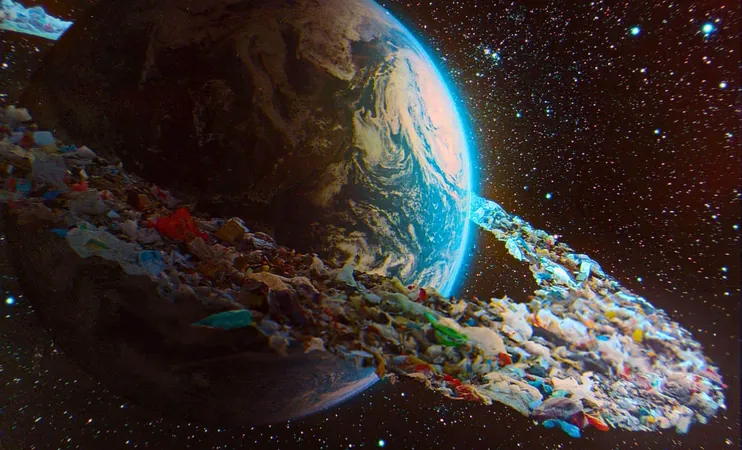
Why the Idea of Sending Our Garbage into Space is Far More Troubling Than You Think
2024-11-25
Author: Ying
Yearly, the Earth generates over two billion tons of waste, with only a fraction being recycled. The staggering amount of waste has led some to consider a radical proposal: sending our garbage into space. As landfill sites fill up and environmental issues rise, this notion may seem like a solution. However, the reality is that it poses insurmountable challenges, including astronomical costs, damaging environmental effects, and significant safety concerns.
The Eye-Watering Costs of Space Waste Disposal
The financial hurdle of launching waste into space is formidable. Even with innovations like SpaceX’s Falcon 9 rocket that are touted to be reusable, the current norm for sending waste into low-Earth orbit hovers around $1,200 per kilogram. This makes the idea of space disposal seem implausible from a financial perspective. As John L. Crassidis, a mechanical and aerospace engineering professor, points out, launching garbage requires substantial fuel and thrust, multiplying expenses.
And that's not all. The additional infrastructure needed for consolidating and transporting billions of tons of waste to launch sites adds another layer of logistical and financial burdens, placing this ambitious proposal well outside any realistic financial framework.
The Environmental Impact of Rocket Launches
While sending garbage into space may sound like a magical solution, the environmental ramifications of rocket launches can’t be overlooked. Each launch produces significant emissions of carbon dioxide and aluminum oxides that can harm the ozone layer and contribute to global warming. For instance, a 2016 Falcon 9 launch released 116 tons of CO2 in mere minutes. With projections indicating a tenfold increase in the number of launches over the next two decades, the environmental toll could become unsustainable, further complicating the waste disposal strategy.
The Perils of Space Debris and Potential Collisions
Sending waste into orbit raises serious concerns about exacerbating the existing issue of space debris. Our low-Earth orbit is already crowded with satellites and fragmented junk, and adding billions of tons of garbage would heighten the risk of catastrophic collisions. Crassidis stresses the importance of ensuring that this waste ventures beyond the Earth's gravitational influence—at least 22,000 miles upwards—to diminish the chances of it becoming a hazard.
The specter of Kessler syndrome, a catastrophic event where collisions create an exponential increase in space debris, is also a damning reality to consider. If not properly managed, our attempts to dispose of waste in orbit could lead to a scenario where our planetary orbit becomes uninhabitable. Moreover, there’s the alarming risk that improperly placed waste may fall back to Earth, with scientists estimating a one-in-ten chance of rocket debris causing fatalities within the next decade.
Why Other Celestial Bodies Aren’t the Answer
Some have suggested alternatives such as dumping waste on the Moon, Mars, or even the Sun. However, these options come with their own set of issues:
**The Moon**: Though lifeless, contaminating the Moon's surface could jeopardize future scientific exploration and colonization efforts. Crassidis succinctly notes, “Do we really want our trash piling up on the Moon?”
**Mars**: Given its potential for human colonization, maintaining Mars' pristine environment is crucial. Sending trash to the Red Planet could threaten its habitability and scientific integrity. Crassidis again emphasizes, “We hope to colonize Mars; we don’t want junk there too.”
**The Sun**: While launching garbage into the Sun may sound appealing, it presents a financial and technical impossibility. According to Crassidis, “It’s just not cost-viable.” The amount of energy required to send materials toward the Sun is significantly greater than other trajectories.
Earth-Based Solutions Are Key
Although the idea of space waste disposal may initially sound captivating, it simply does not hold water under scrutiny. To tackle our waste crisis, we must focus on Earthbound solutions, emphasizing:
- Enhanced recycling and waste reduction strategies.
- Innovative disposal technologies to curtail reliance on landfills.
- International collaboration to implement comprehensive waste management systems.
In conclusion, while the dream of sending our garbage into space invokes images of a cleaner Earth, reality reveals a multitude of overwhelming challenges. The focus should squarely be on responsible waste management solutions here on our home planet.




 Brasil (PT)
Brasil (PT)
 Canada (EN)
Canada (EN)
 Chile (ES)
Chile (ES)
 España (ES)
España (ES)
 France (FR)
France (FR)
 Hong Kong (EN)
Hong Kong (EN)
 Italia (IT)
Italia (IT)
 日本 (JA)
日本 (JA)
 Magyarország (HU)
Magyarország (HU)
 Norge (NO)
Norge (NO)
 Polska (PL)
Polska (PL)
 Schweiz (DE)
Schweiz (DE)
 Singapore (EN)
Singapore (EN)
 Sverige (SV)
Sverige (SV)
 Suomi (FI)
Suomi (FI)
 Türkiye (TR)
Türkiye (TR)